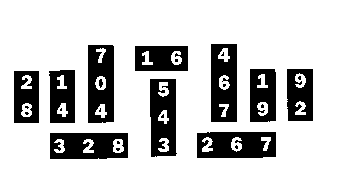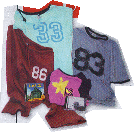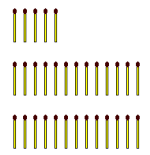March
16, 2002:

Arrange
the 10 tiles shown into a 5 X 5 array of numbers in such a way that the 5-digit
horizontal numbers match the 5-digit vertical numbers.
Not a trivial task, unless you have this
Mensa Tiles program. Implementing a puzzle type from
the "Mensa Number Puzzles" book, this program allows user play as well
as solving puzzles by exhaustive search. You can also enter
and save your own versions of puzzles.
Documenting
this program brought to mind an article: "Learn to Program in 10
Years". I'll dig it out and provide the reference one of these
days, but the gist of it is that programming is not a skill that can be mastered
in 24 hours or 21 days as many book titles would imply. On the other
hand, maybe there are only a few dozen tricks/techniques that, once learned,
move you a long way down the road. A number of them occur in this program.
March
20, 2002:
We'll be doing grandkid things for the next week or so, so I may not have much
time to post new programs. Here is one that represents a rather
startling new voice recognition technology. I had originally
planned to post this in a week or 10 days, but I'll do it now while I think of
it. It's called Card
Trick to throw would-be cyber thieves off the track.
I
had some feedback from Dan Thomasson this week. Dan had stumbled on
my
Knight's Tour program and happens to run a Knight's Tour site at http://www.borderschess.org/KnightTour.htm.
If you want more in-depth knowledge, check it out.
There
is a new beginner's Delphi programming class starting over at www.delphi.about.com.
It may be worth spending some time there, if you can tolerate the irritating
pop-up ads. Personally, I can stand it only for a few minutes - about the
third time I get interrupted while trying to concentrate, I'm gone.
What a shame.
On
a typical day, we get 500-1000 hits on all pages, many from search engine
crawlers I'm sure. There are usually a half-dozen or so page
errors reported, sometimes obvious typing errors, sometimes not. If
you get any "Page not found" or other errors while browsing around
here that are not the result of your typing, please use the feedback
link to let me know. I'll fix any I can track down.
March
30, 2002:
Back from travels, including that harrowing trip up
I-95
interstate through New Jersey, New York and Connecticut. If you only care
to exceed the posted speeds by 10 mph, you had better stay in the slow lane.
No new programs this week but, since tomorrow is Easter, I resurrected this Easter
Dates program. (The devil made me say that.) It calculates
dates of Easter for any year in the Gregorian calendar, and gives a little
history of how the dates are determined.
 April
8, 2002: Here's
the last version of Hangman: Hangman
2 - The Tricky Hangman. It adds a dictionary and computer play to the
earlier version. The program plays the role of Convict about the same way
as humans - it just does it better. As Hangman, the program selects
a random word from the dictionary and scores Convict responses. The
"Tricky" Hangman may bend the rules just a little (but only to
ensure that justice is served).
April
8, 2002: Here's
the last version of Hangman: Hangman
2 - The Tricky Hangman. It adds a dictionary and computer play to the
earlier version. The program plays the role of Convict about the same way
as humans - it just does it better. As Hangman, the program selects
a random word from the dictionary and scores Convict responses. The
"Tricky" Hangman may bend the rules just a little (but only to
ensure that justice is served).
|
April
10, 2002: |
|
|
|
I
posted a demo today over in Delphi Techniques showing how to include
Animated
Cursors in Program Resource files. I haven't figured out
how to use animated cursors on Web pages yet though - probably a blessing
in disguise.
April
14, 2002:
Here's the link to the interesting online article, "Learn
to Program in 10 Years", that I mentioned a few
weeks ago. Just ran across the reference so thought I had
better post it before it disappeared again.
 April
21, 2002: This
week we're beginning the investigation of a fairly major topic in the world of
Computational Game Theory: minimax
search of game trees. Minimax is a technique for finding good
moves for a large class of two player games. Today's
implementation is NIM,
a simple game that meets the minimax criteria.
Players alternate removing 1, 2, or 3 sticks from a pile; the player taking the
last one loses. Two hundred or so lines of code are enough to get
the Delphi programmer started. Non-programmers are welcome to
download and play the executable version, but more interesting games of this
type will follow.
April
21, 2002: This
week we're beginning the investigation of a fairly major topic in the world of
Computational Game Theory: minimax
search of game trees. Minimax is a technique for finding good
moves for a large class of two player games. Today's
implementation is NIM,
a simple game that meets the minimax criteria.
Players alternate removing 1, 2, or 3 sticks from a pile; the player taking the
last one loses. Two hundred or so lines of code are enough to get
the Delphi programmer started. Non-programmers are welcome to
download and play the executable version, but more interesting games of this
type will follow.
April
24, 2002:
Jerry Pournelle,
of Byte magazine fame, features a Book
of the Month in each column; maybe I'll start doing the same.
This month it would definitely be Martin Gardner's The
Colossal Book of Mathematics, W.W.Norton, & Co.,
2001. It's a collection selected by Gardner of the his 50 best
"Mathematical Recreations" columns originally printed in Scientific
American magazine. This is the 17th published anthology
of those columns, but if you are going to own only one, this is probably it.
 Chapter
3, "Palindromes: Words and Numbers" led directly to today's program,
the third in the T-Shirt series, T-Shirts
#3, Back of the shirt reads: "The
only known non-palindromic integer whose cube is a palindrome"
The number on the front is ???. Palindromes, by the
way, are numbers (or words or sentences) that read the same from
either end.
Chapter
3, "Palindromes: Words and Numbers" led directly to today's program,
the third in the T-Shirt series, T-Shirts
#3, Back of the shirt reads: "The
only known non-palindromic integer whose cube is a palindrome"
The number on the front is ???. Palindromes, by the
way, are numbers (or words or sentences) that read the same from
either end.
April
26, 2002:
I've been doing some housekeeping - among other things the indices in the
Programs section of the site are now in alphabetical order. I also
updated Permutes 1,
a program introducing permutations, the ways that a set of objects or numbers
can be arranged. And the new entry is Permutes
2 which adds the ability to permute subsets of a set of
numbers, and combinations, the ways to select subsets if order does not
matter. Permutes 2 also includes and tests the Combo
unit, a unit providing a convenient interface for permutation and
combination generation.
 April
29, 2002: Here's
Nim 2, the multi--pile
version of that take away game. This was originally intended to
be an more challenging implementation of the Minimax search technique described
last week. But it turns out that there is an even cooler algorithm based on the
binary representations of the number of sticks in each pile. It's good
enough to let the computer defeat mere mortals most of the time.
April
29, 2002: Here's
Nim 2, the multi--pile
version of that take away game. This was originally intended to
be an more challenging implementation of the Minimax search technique described
last week. But it turns out that there is an even cooler algorithm based on the
binary representations of the number of sticks in each pile. It's good
enough to let the computer defeat mere mortals most of the time.
____________________
Gary Darby
http://delphiforfun.org
"Your decision to be, have and do something out of ordinary entails facing difficulties that are out of the ordinary as well. Sometimes your greatest asset is simply your ability to stay with it longer than anyone else." -- Brian Tracy
|
|
|
|
|